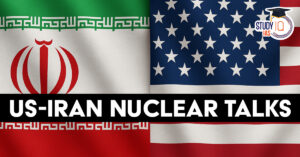Table of Contents
Sino-American Rivalry: A New Form of Bipolarity
- Although the two nations race for global hegemony, their economies are deeply interconnected.
- Key connections include:
- The U.S. is the largest investor in China.
- China holds the most U.S. Treasury Bonds.
- The U.S. sends more tourists to China than to any other Asian country.
- China has more students in the U.S. than any other country.
- The relationship between the U.S. and China reflects a form of global competition but is distinct from the Cold War-era bipolarity between the U.S. and the U.S.S.R.
Differences from Cold War Bipolarity
| Aspect | Cold War Bipolarity (U.S. vs. U.S.S.R.) | Present-Day Bipolarity (U.S. vs. China) |
| Economic Relationship | Total economic separation; no significant trade or financial ties | Deep economic interdependence (e.g., U.S. investment in China, China’s holdings of U.S. Treasury Bonds) |
| Nature of Rivalry | Ideological (Capitalism vs. Communism) | Power-based, with limited ideological conflict; focus on global hegemony |
| Alliances and Camps | Rigid alliances with satellite states (e.g., NATO, Warsaw Pact); divided by the “Iron Curtain” | Fluid alliances (e.g., Quad, AUKUS); not divided into strict global camps |
| Proxy Wars | Numerous proxy wars (e.g., Vietnam, Korea, Afghanistan) | Fewer proxy wars; neither U.S. nor China shows much appetite for direct conflict |
| Strategic Approach | Containment (military and ideological containment of communism) | De-risking (mitigating risks while maintaining economic connections) |
China’s Rise
- China’s rise has been rapid since the 2008-09 financial crisis, with American investment fueling its industrial growth.
- Key points:
- China is the world’s leading manufacturing and industrial giant, rivalling the U.S. in economic size and surpassing its surpluses.
- China’s critical role in global supply chains makes a complete separation unfeasible.
- China competes in advanced technologies, such as 5G.
- China is the world’s leading manufacturing and industrial giant, rivalling the U.S. in economic size and surpassing its surpluses.
- Military Front: The Chinese navy now surpasses the U.S. in the number of battle-force ships (according to the Pentagon Report).
The Role of Russia in the U.S.-China Rivalry
- Russia continues to play a role in the developing U.S.-China bipolarity.
- Though not an equal third pole, Russia’s alliance with China — and China’s support for Russia in Ukraine — adds complexity to global geopolitics.
- Despite a smaller economy and military budget, Russia’s nuclear arsenal and natural resources give it an outsized influence.
Indo-Pacific: A New Geopolitical Arena
- The rise of the Indo-Pacific as a key battleground marks a shift in geopolitical focus from the Atlantic to the Indian and Pacific Oceans.
- Factors driving this include:
- China’s ambition to build a blue-water navy and become a transcontinental economic power.
- India is seen as a potential counterbalance to China’s influence, with deepening ties with the U.S. and participation in initiatives like:
- The Quad (U.S., India, Japan, Australia): Advocates for a “free and open Indo-Pacific.”
- The Squad (U.S., Japan, Australia, Philippines): An expanded alliance to confront China.
- AUKUS (Australia, U.K., U.S.): A trilateral security pact to assist Australia in acquiring nuclear-powered submarines.
India’s Position and Challenges
- India faces both challenges and opportunities due to its geographical proximity and economic relations with China.
- It must:
- Restore the status quo along its border with China.
- Engage economically where necessary.
- Strengthen its military deterrence.
- Promote its geopolitical and economic interests independently, avoiding being reduced to a pawn in Sino-American competition.


 Global Labour Shortage and Opportunities...
Global Labour Shortage and Opportunities...
 India-Middle East-Europe Economic Corrid...
India-Middle East-Europe Economic Corrid...
 US-Iran Nuclear Talks: Key Developments ...
US-Iran Nuclear Talks: Key Developments ...






















